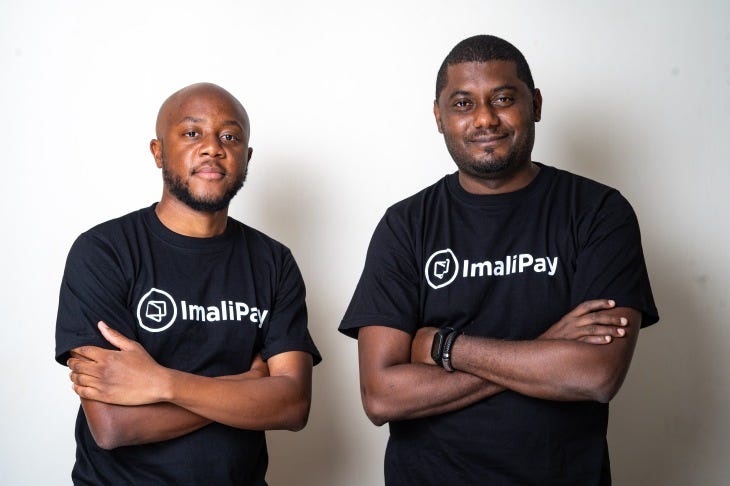ImaliPay, which bills itself as a one-stop shop for financial services, has closed a $3 million seed round in debt and equity. In 2020, the fintech raised a $800,000 pre-seed investment.
The funding that came after the one from Google Black Founders Fund last October had Leonnis Investments on board.
Follow-up investors from VCs like Ten 13, Uncovered Fund, MyAsia VC and Jedar Capital also joined the round. Angel investors like Keisuke Honda of KSK Angels and others from Serbia, Kenya, and Norway also joined, as well.
Read also ImaliPay Attracts Pre-Seed Funding For Gig Workers’ Financial Needs
The money will be used to grow the company’s 50-man team, improve its technology, and look into new markets like Ghana and Egypt, the company’s founders said.

Why The Investors Invested
The startup has generated considerable traction since it was founded. In just 15 months, ImaliPay’s users have grown 60x. In the “tens of thousands,” gig workers on the platform use 4,500 points of sale to get their services from the company. More than 200,000 transactions have been made on ImaliPay’s platform so far. There are transaction and referral fees that the pan-African embedded finance provider makes from these two things.
A Look At What The Startup Does
Imalipay was founded in late 2020 by Tatenda Furusa and Oluwasanmi Akinmusire in response to the difficulties faced by ride-hailing drivers in Nairobi when it came to obtaining working cash or dealing with situations such as running out of fuel.
“A couple of things connected to this point,” CEO Furusa said on how the company started. “One time, a Bolt driver ran out of fuel in Nairobi when I was coming from the airport and couldn’t top off immediately. It triggered me to think of what other pains these gig workers might be experiencing. We researched the gig economy and found that they were neglected by some financial services. And we saw that we were perfectly placed on building a fintech solving the problems of Africa’s gig economy workers, freelancers and self-employed digital workers.”
ImaliPay’s pilot was inspired by Furusa’s experience: a buy now, pay later (BNPL) fuel product, but for two-wheeler gig platforms, as the company collaborated with a few fuel stations in Ibadan, Nigeria, to provide this service to SafeBoda riders.
Read also UK’s Fintech Dapio in $3.4M Gets Backing From Flutterwave on Contactless Payments
The business then built a partner ecosystem in which some partners provide it access to new consumers while others support its ecosystem and marketplace.
“We built out other services around spare parts, smartphones, power banks, savings and investments, and insurance bundled with those products,” said Furusa. “So like accident covers and income protection loss insurance, we intertwine these products so gig workers can qualify for each product based upon their transactional behavior.”
Imalipay currently has 15 partners, including Bolt, Glovo, SWVL, Amitruck, Safeboda, Gokada, and Max.ng.
The startup has also collaborated with other platforms to provide additional financial services such as insurance (health and income protection loss) and savings in Kenya and South Africa.
They number around 35 in total, and some of them are Lami, Cowrywise, Ola Energy, Total Energies, HiFi Corporation, and Britam.
Read also Africa’s Transporters Adopt Cellulant’s Technology in Bid to Digitize the Sector
The startup provides these financial services to the network’s gig workers via linking its APIs to partner companies or directly through an independent app, chatbot, or USSD.
The COO of ImaliPay, Akinmusire, and Furusa met at Cellulant, where they worked before starting ImaliPay.
Imalipay gig platform Imalipay gig platform
Charles Rapulu Udoh

Charles Rapulu Udoh is a Lagos-based lawyer, who has several years of experience working in Africa’s burgeoning tech startup industry. He has closed multi-million dollar deals bordering on venture capital, private equity, intellectual property (trademark, patent or design, etc.), mergers and acquisitions, in countries such as in the Delaware, New York, UK, Singapore, British Virgin Islands, South Africa, Nigeria etc. He’s also a corporate governance and cross-border data privacy and tax expert.
As an award-winning writer and researcher, he is passionate about telling the African startup story, and is one of the continent’s pioneers in this regard. You can book a session and speak with him using the link: https://insightsbyexperts.com/view_expert/charles-rapulu-udoh
